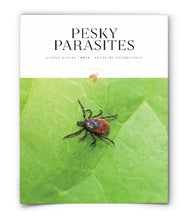Raise your hand if you’ve ever pulled a tick off of yourself or a pet. Did you know that tiny little arachnid is actually something called a parasite? A parasite, like the tick in this case, lives off of a host organism. The parasite benefits from the relationship (known as parasitism) but causes harm to the host. Although it is often in the best interest of the parasite to leave the host alive, with some parasitic relationships, the host animal can die. Parasitism is a form of symbiosis like mutualism and commensalism, although parasitism can damage the host species. Symbiotic relationships are defined as “interactions between two different organisms living in close physical association.” In mutualism, both species benefit from the interaction while commensalism involves one benefitting party. But unlike in parasitism, commensalistic relationships don’t involve harm to the host.




